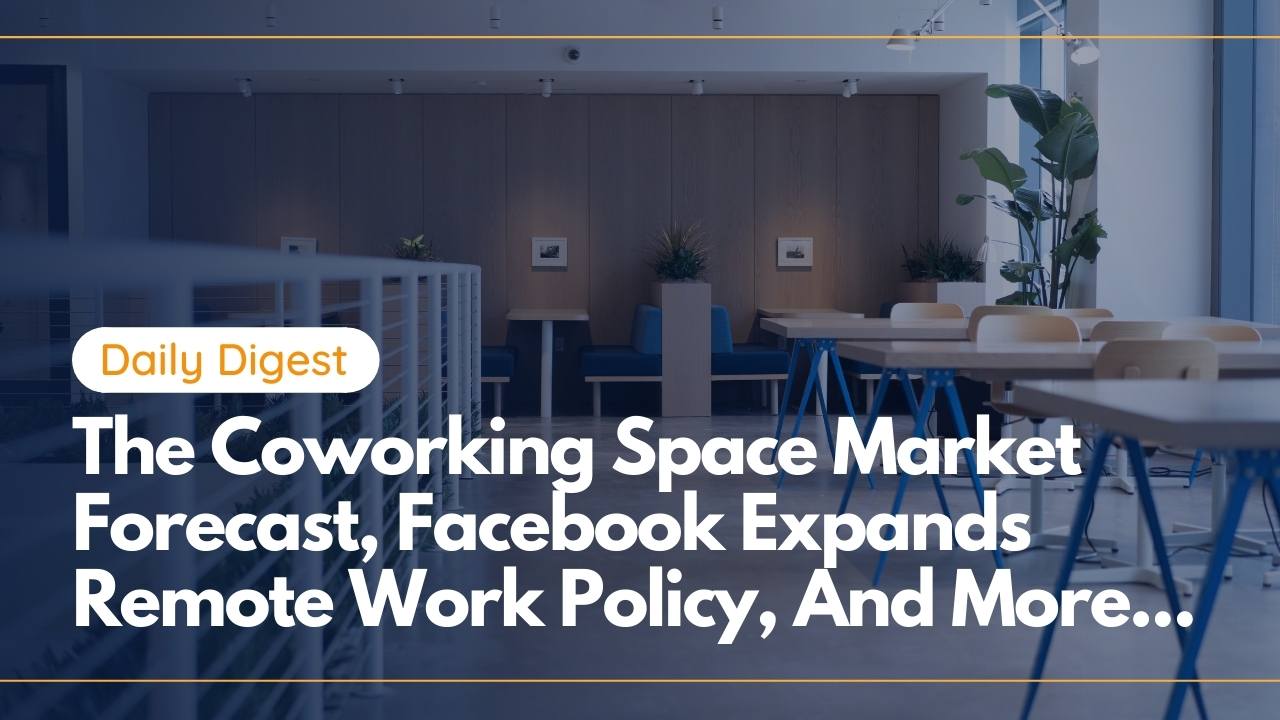Hand selected flexible workspace news from the most reliable sources to keep you ahead of the pack. We find all the latest news, so you don’t have to. Morning and afternoon updates. Stay in the know.
Here’s what you need to know today:
- Facebook Expands Remote Work Policy
- The Coworking Space Market Forecast
- Office Furniture Firm Reveals Post-pandemic Workplace
- White-collar Workers Experiencing Poor Sleep
- The Challenges Facing The Office Sector
- Kentucky Hotel Operator To Open New Coworking Space
Facebook Expands Remote Work Policy
Facebook has announced it will allow all employees to work remotely if they have office-based jobs. However, workers may see a deduction in pay if they move to a less-expensive area.
Starting June 15, all Facebook staffers will have the ability to request working from home, but will still be encouraged to come into the office for team-building and collaborative projects.
The social media giant plans to open most of its offices in the U.S. by at least 50% capacity by early September, with a full reopening planned in October. By the end of 2021, employees will be able to work up to 20 business days from any location apart from their homes.
“As part of my commitment to remote and hybrid work, I plan to spend as much as half of the next year working remotely,” Mark Zuckerberg, CEO of Facebook, told employees. “I’ve found that working remotely has given me more space for long-term thinking and helped me spend more time with my family, which has made me happier and more productive at work.”
In addition to expanding its remote work policies, the company is also allowing more workers to move to other countries. Prior to this, only workers in technical or recruiting roles were allowed this option.
The Coworking Space Market Forecast
According to the Coworking Space Global Market Report 2021: COVID-19 and Change to 2030, the global coworking space market is anticipated to grow from $7.97 billion last year to $8.41 billion this year.
Even more, by 2025, the market is expected to reach $13.03 billion at a compound annual growth rate (CAGR) of 12%.
The report covers the coworking spaces market that are seeing the strongest growth and which markets will be playing a role in shaping the workforce over the next ten years.
The ongoing growth is largely due to companies adjusting their operations in a post-pandemic world, which has accelerated the need for remote working and hybrid policies.
In March 2020, many workers were forced to work from home, leaving coworking operators seeing a huge dip in usage. However, the return to the office has led to a spike in demand for alternative work solutions, which is where coworking spaces come in.
Additionally, the increasing desire for more sustainable work amenities has made coworking spaces an ideal choice. Many of these workplaces often incorporate eco-friendly aspects, using greenery, natural lighting, non-toxic paints and more to create a more sustainable workspace.
Office Furniture Firm Reveals Post-pandemic Workplace
Office furniture manufacturer Vitra is launching its first “Club Office” at its headquarters in Basel, Switzerland this month.
Located in the company’s head office, Club Office was created for Vitra’s research and development team in order to offer workers the ideal post-pandemic workplace.
“Those who choose to go to the office today and in the future do so consciously – to meet colleagues and experience a sense of belonging and appreciation,” said Nora Fehlbaum, CEO of Vitra. “The common mission and organisational purpose should be perceptible. Consequently, it must be more than just a place of work. Today, an office needs to provide added value. If an office has no character and colleagues there hide from one another, it’s better to spare the commute and stay at home.”
The Club’s members will have access to its three different zones: the public section, a semi-public area and the private zone.
The public area will offer a space for spontaneous meetings, informal collaboration and mutual learning. The semi-public section will be used for formal collaboration, allowing members to reserve the space for project work. The private zone will feature workstations that are made for individual, focused work.
White-collar Workers Experiencing Poor Sleep
A study from Integrated Safety Support of 1,000 white-collar workers found that nearly half of respondents reported a decline in the quality of their sleep over the past year.
Women in particular struggled more than men, with 35% stating below average sleep quality in comparison to 25% of men.
The research also revealed that more than one in three workers check their emails right before bed, 35% work in their pajamas and 31% work from their beds. These habits can cause boundaries between work and home to blur, which can lead to burnout.
Young workers specifically found it difficult to separate their personal and professional lives, mainly due to the lack of space they have in their homes for a dedicated workspace. In fact, workers under 25 were twice as likely to work from their bed compared to those 25 and over.
According to Dr. Adam Fletcher, founder of Integrated Safety Support, business leaders need to do more to support a healthy sleeping culture in their workforce.
“Fatigue in the workplace is a shared risk – both to safety and performance – so it’s also a shared responsibility amongst management and their teams to create conditions that support healthy sleep, improve productivity and minimise fatigue,” said Dr. Fletcher.

The Challenges Facing The Office Sector
As the U.S. slowly begins to reopen, companies are navigating the best way to bring employees back into the office. However, leaders will need to recognize that the world’s largest remote working experiment has left many employees desiring this arrangement in the long-term.
At the same time, the office sector is facing its own issues with low occupancy and increased sublease space. So how do businesses satisfy the needs of workers?
The misconception that remote working leads to lower productivity was diminished over the past year, and employers are expected to pivot away from collaborative, open plans in favor of design that abides by health and safety protocols.
Still, according to Catherine Liu, an associate manager at research firm Trepp, “the long-term nature of office leases allowed borrowers to maintain debt service obligations even though physical occupancy dropped off significantly during the height of the pandemic.”
Liu added that the occupancy rates between March 2020 and April 2021 had been declining across the top 25 metropolitan markets with the largest commercial mortgage-backed securities (CMBS) exposure.
“While the larger space inventory and the potential for lower demand due to hybrid work models will suppress re-absorption and keep a lid on asset values in the near term, concerns about the ‘death of the office’ or ‘death of gateway cities’ have largely been overblown,” said Liu.
Kentucky Hotel Operator To Open New Coworking Space
Al J. Schneider, the largest owner-operator of hotels in Kentucky, will open a new coworking space on the 11th floor of Louisville’s Center Tower of the Waterfront Plaza Building.
CO11AB will provide 7,826 square feet of office space that has a capacity of 63 members. It will feature two huddle rooms, a conference room, private phone booths, mailing services, Wi-Fi, copier and scanner machine, a kitchen, a shuffleboard table and more.
Situated in downtown Louisville, the company aims to provide an alternative workspace for the growing number of remote workers.
The space will feature three monthly membership options, including: the Hot Spot membership that provides access to the common areas, the Dedicated Desk membership that provides users with a personal desk and the Office membership that provides members with modern offices.



 Dr. Gleb Tsipursky – The Office Whisperer
Dr. Gleb Tsipursky – The Office Whisperer Nirit Cohen – WorkFutures
Nirit Cohen – WorkFutures Angela Howard – Culture Expert
Angela Howard – Culture Expert Drew Jones – Design & Innovation
Drew Jones – Design & Innovation Jonathan Price – CRE & Flex Expert
Jonathan Price – CRE & Flex Expert














